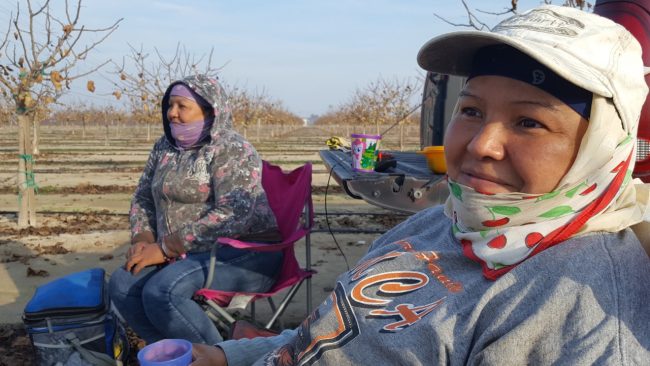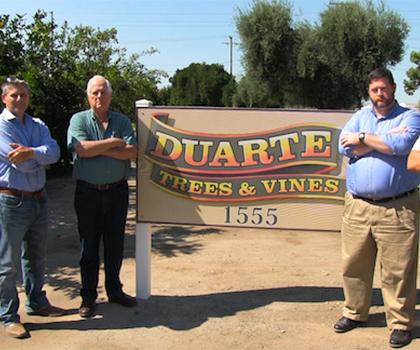Tony Francois Suggested Duarte Settle
Judge Refused to See New Evidence in John Duarte Trial, Forcing Him to Settle
By Patrick Cavanaugh Farm News Director
Duarte Nursery, its president John Duarte, and legal counsel, Pacific Legal Foundation, agreed to a settlement with the federal government over the Army Corps of Engineers’ nearly five-year enforcement action for Duarte’s routine plowing of his wheat field in late 2012, said PLF senior attorney Tony Francois, who represents Duarte, gratis.
Among the main reasons for Duarte’s settlement is the judge’s refusal to consider new evidence regarding the restored condition of the vernal pools on Duarte’s land, which were at the nucleus of the controversy.
“Vernal pools are wet six to eight weeks out of the year due to rainfall,” according to Francois. “They have a kind of hard pan underneath them, so the water stays in place for a bit.”
“On August, 15, the morning of the trial, we intended to provide the judge with current evidence of the good condition of the vernal pools to show there was no significant harm to the environment from plowing the property,” Francois said.
“However, the government persuaded the judge to exclude that evidence,” Francois explained. “The government claimed that vernal pool-specific vegetation would not recover from being plowed.”
“We also were prepared to show how any significant penalty would affect Duarte Nursery and its ability to maintain its workforce. The judge allowed some older evidence, but excluded the most current evidence, basically, of the company’s ability to pay,” he said.
“Both rulings were significant because the court was supposed to consider those two factors in imposing their penalty,” Francois explained. “The judge actually acknowledged that excluding evidence of the current condition of the vernal pools would make a material difference on how large a penalty would be imposed.”
“Nonetheless, the judge excluded evidence on the legal grounds that it would be unfair to the government because they had not asked for or taken any steps to update their own information,” Francois said.
Francois explained how easily they could have demonstrated the vernal pools were undamaged.
“First, the vernal pools themselves are all still there. Second, the government’s own evidence shows that all the vernal pools still exist,” he said. “Our experts went out there last year and this year and showed that, with normal rainfall, the vernal pools are doing fine. The vegetation is healthy and fairly abundant, with all the right types of plants present. Basically, our evidence showed there was no harm done to the vernal pool from plowing.”
“Now, some of the scars to the vernal pools from government’s excavation may still be there,” he continued. “That, I have not seen, myself. But, as far as the plowing, our evidence that it had not harmed the vernal pools, is what the court excluded.”
According to Francois, the government claimed that Duarte’s current evidence was unfair to them because they had not taken any opportunities to update their own experts’ view of the property or to request access for inspection. “The result of the ruling was to cut off consideration of how plowing affected the vernal pools to the time period when California was in the midst of a multi-year drought,” he said.
“We think there were a number of ways the government could have looked at the evidence, if it were admissible, and responded to it, including driving to the property and observing several of the vernal pools from the road. In fact, seeing the vernal pools from the roadside is what lead the Army Corps to claim the violation in the first place,” Francios noted.
Duarte did not get a permit, according to the Clean Water Act, to plow the land, but Francois explained, “That is not really the problem. The problem is, a farmer reads the Clean Water Act that says ‘normal farming practices’ do not require a permit. The farmer knows what normal farming practices are; I would think that everybody knows that plowing is a normal farming practice.”
“You read a little further, and the regulations actually say that plowing to produce a crop is never even a discharge under the Clean Water Act. Plowing, in a very wide general sense, is not even regulated by the Army Corps of Engineers. It’s not a question of the type of plowing or if plowing in this location requires a permit. The law speaks clearly and broadly and says that you do not need a permit.”
“Nevertheless, the U.S. Army Corps of Engineers, backed up by the Justice Department, has reinterpreted what plowing and normal farming practices are in a way that is very unclear as to when they will think you need a permit and when they will think you don’t. So, if they think you needed a permit, and it never occurred to you that you would need one, this is what can happen to you. We deposed several employees and even officials with the Army Corps of Engineers about their understanding of all this. They were pretty clear; there is no way for a farmer to know without asking the Army Corps in advance what a normal farming practice is.”
“The entire U.S. agricultural industry is up against this scenario right now. One of the interesting things about the Army Corps’ approach—‘Just come and ask us’—is what how their press release announced the settlement,” according to Francois. “Anybody who wants to is welcome to come and ask us and we’ll tell you what you have to do.”
“Here is how that works in practice,” Francois explained. “You can go and ask the Army Corps. They are going to say you need to prepare an expensive study on whether there are any navigable waters on your property, and then we’ll tell you whether we agree with it or not. Then, you have to tell us everything you’ve done in the past and everything you plan on doing, and we will tell you whether what you plan to do is normal.”
“They way they view it, ‘normal’ does not mean ‘something that farmers normally do.’ They reinterpret ‘normal’ to mean something done routinely done on this property. If you have not done the particular practice on this property routinely in the past, they think of the practice in terms of conversions, changes in use and zoning. Their view is if you are changing things, you probably need a permit if there is anything they consider navigable waters on the property,” he said.
“So, for example, this property was in the Conservation Reserve Program for a number of years under a prior owner. The Army Corps convinced the judge in this case that because it had not been plowed in several years, plowing was no longer normal on this property. How many farmers who have their land enrolled in the Conservation Reserve Program are aware that the Corps of Engineers is going to expect to get their permission to resume plowing it?”
The United States Department of Agriculture (USDA) Farm Service Agency (FSA) oversees the Conservation Reserve Program (CRP). According to the CRP website, “In exchange for a yearly rental payment, farmers enrolled in the program agree to remove environmentally sensitive land from agricultural production and plant species that will improve environmental health and quality. Contracts for land enrolled in CRP are 10-15 years in length. The long-term goal of the program is to re-establish valuable land cover to help improve water quality, prevent soil erosion, and reduce loss of wildlife habitat,” Francois said.
“Or, let’s say, you have been through a business reorganization, an estate process, or just for market reasons, your land has been fallow for a few years,” Francois said. “Perhaps you have not built something or put the land to grazing. After all those scenarios, the Corps of Engineers told us there is probably a permit required.”
Farmers may view these activities as normal farming practices that do not need a permit, only to learn at the end of this process, a permit was warranted.
Francois believes, “In essence, the Army Corps has taken a protection from permitting in the Clean Water Act and turned it into a permit application in which, randomly, they will tell you, ‘Thanks for filing this expensive and time-consuming permit application. You don’t need a permit.’ ”
“We are optimistic that even though these issues are not properly resolved in this case, we will continue litigating these issues until the courts clearly reinforce and enforce the clear protection for farming in the Clean Water Act. We believe that farmers, and really all citizens, all regulated parties, should be able to rely on the clear text of the law rather than be subject to all this after-the-fact rewriting, reinterpreting and explaining away that the Corps has done in cases like this.”






















